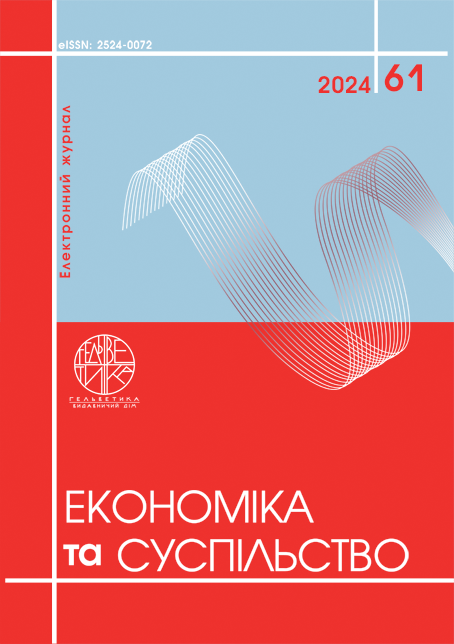OUTSOURCING AS A HUMAN RESOURCE MANAGEMENT TOOL IN THE CONTEXT OF GLOBALIZATION
Abstract
The article explores the role of outsourcing as a human resource management tool in the context of globalization. It emphasizes key aspects such as motivation, incentivization, and staff stabilization through improving the psychological atmosphere and optimizing material incentives. The article explores motivation as the process of stimulating employees to satisfy their needs and interests, as well as the mechanism of motivation formation that impacts organizational effectiveness. Additionally, personnel outsourcing is analyzed as a means of efficient resource allocation and competitiveness enhancement, along with corporate culture as a system of shared values that shapes organizational identity. The article underscores the role of human resource management tools such as motivation, stimulation, outsourcing, and corporate culture formation in achieving organizational effectiveness and their interaction with other management system elements. The article discusses the role of outsourcing as a strategic tool for enhancing competitiveness, particularly in the IT sector. Ukrainian companies are increasingly using outsourcing as a strategic tool to improve their efficiency and ensure competitiveness. Outsourcing involves delegating part of the work tasks or functions to other companies for execution, which can be driven by various reasons such as lack of internal expertise or the need for temporary solutions. Ukraine ranks 42nd among countries with high potential for outsourcing, according to the Global Services Location Index. Outsourcing companies provide a variety of services such as recruitment, personnel management, staff development, and assistance in crisis resolution, allowing businesses to focus on core aspects of their operations. The global outsourcing market is forecasted to grow to $75.89 trillion between 2023 and 2027, indicating the dynamic development of this sector. Research shows that companies are increasingly opting for outsourcing to optimize production processes, service information needs, and to transfer a complex of business processes.
References
Deloitte Global Outsourcing Survey 2022. Navigating talent, technology, and new ways to outsource. URL: https://www2.deloitte.com/content/dam/Deloitte/us/Documents/process-and-operations/us-global-outsourcing-survey-2022.pdf (дата звернення: 13.02.2024).
Donnellan M. Outsourcing of Business Processes. Advice from the financial director. 2006. С.25
Алтинпара А. О., Корогодова О. О. Аутсорсинг як інструмент розвитку компаній ІТ-сектору України в умовах Індустрії-4.0. Економічний вісник Національного технічного університету України «Київський політехнічний інститут». 2019. № 16. С. 140–152. URL: http://nbuv.gov.ua/UJRN/evntukpi_2019_16_18. (дата звернення: 13.02.2024).
Інститут аутсорсингу США. 2024. URL: http://outsourcing.com/ (дата звернення: 05.02.2024).
Інструменти управління персоналом. 2016. URL: https://dimitry15dd.blogspot.com/2016/11/blog-post_72.html
Межевов Н. А. Маркетингові технології формування конкурентних переваг аутсорсингу. К.: Державний університет управління, 2010. С. 55.
Нікішов А. Що таке аутсорсингова компанія? URL: https://fillin.ua/stati/autsorsingovaya-kompaniya-chto-eto-takoe/ (дата звернення: 28.12.2023)
Сазонець О. М. Визначення ефективності інвестиційного проектування в інформаційні технології. Економіка і регіон. 2009. №4(23). С. 148–151.
Тонюк М.О. ІТ аутсорсинг в Україні :тенденції та прогнози розвитку. Ефективна економіка. 2016. № 1. URL: http://www.economy.nayka.com.ua/?op=1&z=4723 (дата звернення: 11.02.2024).
Шипунова О. В. Аналіз чинників ризику на різних етапах створення інформаційних систем. Вісник Дніпропетровського національного університету. Серія Економіка. 2017. Вип. №5 (1). С. 142–147. URL: https://essuir.sumdu.edu.ua/bitstream-download/123456789/57710/7/Sypunova.pdf;jsessionid=C00FC3C04F856EDD613955BE5DFB066A (дата звернення: 13.02.2024).
Deloitte Global Outsourcing Survey 2022. Navigating talent, technology, and new ways to outsource. Available at: https://www2.deloitte.com/content/dam/Deloitte/us/Documents/process-and-operations/us-global-outsourcing-survey-2022.pdf (accessed February 13, 2024).
Donnellan M. (2006). Outsourcing of Business Processes. Advice from the financial director, рр. 25.
Altynpara A. O., Korohodova O. O. (2019). Autsorsynh yak instrument rozvytku kompanii IT-sektoru Ukrainy v umovakh Industrii-4.0. [Outsourcing as a tool for development of IT sector companies in Ukraine in the Industry 4.0 conditions]. Ekonomichnyi visnyk Natsionalnoho tekhnichnoho universytetu Ukrainy «Kyivskyi politekhnichnyi instytut» - Economic Bulletin of the National Technical University of Ukraine "Kyiv Polytechnic Institute", vol. 16, pp. 140–152. Available at: http://nbuv.gov.ua/UJRN/evntukpi_2019_16_18. (accessed February 13, 2024).
Instytut autsorsynhu SShA (2024). [Outsourcing Institute USA]. Available at: http://outsourcing.com/ (accessed February 05, 2024).
Instrumenty upravlinnia personalom (2016) [Human Resource Management Tools]. Available at: https://dimitry15dd.blogspot.com/2016/11/blog-post_72.html
Mezhevov N. A. (2010). Marketynhovi tekhnolohii formuvannia konkurentnykh perevah autsorsynhu [Marketing Technologies for Creating Competitive Advantages in Outsourcing]. pp. 55.
Nikishov A. Shcho take autsorsynhova kompaniia? [What is an outsourcing company?] Available at: https://fillin.ua/stati/autsorsingovaya-kompaniya-chto-eto-takoe/ (accessed December 28, 2023).
Sazonets O. M. (2009). Vyznachennia efektyvnosti investytsiinoho proektuvannia v informatsiini tekhnolohii [Assessing the efficiency of investment project planning in information technology.]. Ekonomika i rehion - Economics and Region, vol. 4(23), pp. 148–151.
Toniuk M.O. (2016). IT autsorsynh v Ukraini :tendentsii ta prohnozy rozvytku [IT outsourcing in Ukraine: trends and development forecasts]. Efektyvna ekonomika - Efficient Economy, vol. 1. Available at: http://www.economy.nayka.com.ua/?op=1&z=4723 (accessed February 11, 2024).
Shypunova O. V. (2017). Analiz chynnykiv ryzyku na riznykh etapakh stvorennia informatsiinykh system [Analysis of risk factors at different stages of information systems development]. Visnyk Dnipropetrovskoho natsionalnoho universytetu. Seriia Ekonomika - Bulletin of Dnipropetrovsk National University. Series Economics, vol. 5(1), pp. 142–147. Available at: https://essuir.sumdu.edu.ua/bitstream-download/123456789/57710/7/Sypunova.pdf;jsessionid=C00FC3C04F856EDD613955BE5DFB066A (accessed February 13, 2024).

This work is licensed under a Creative Commons Attribution 4.0 International License.


